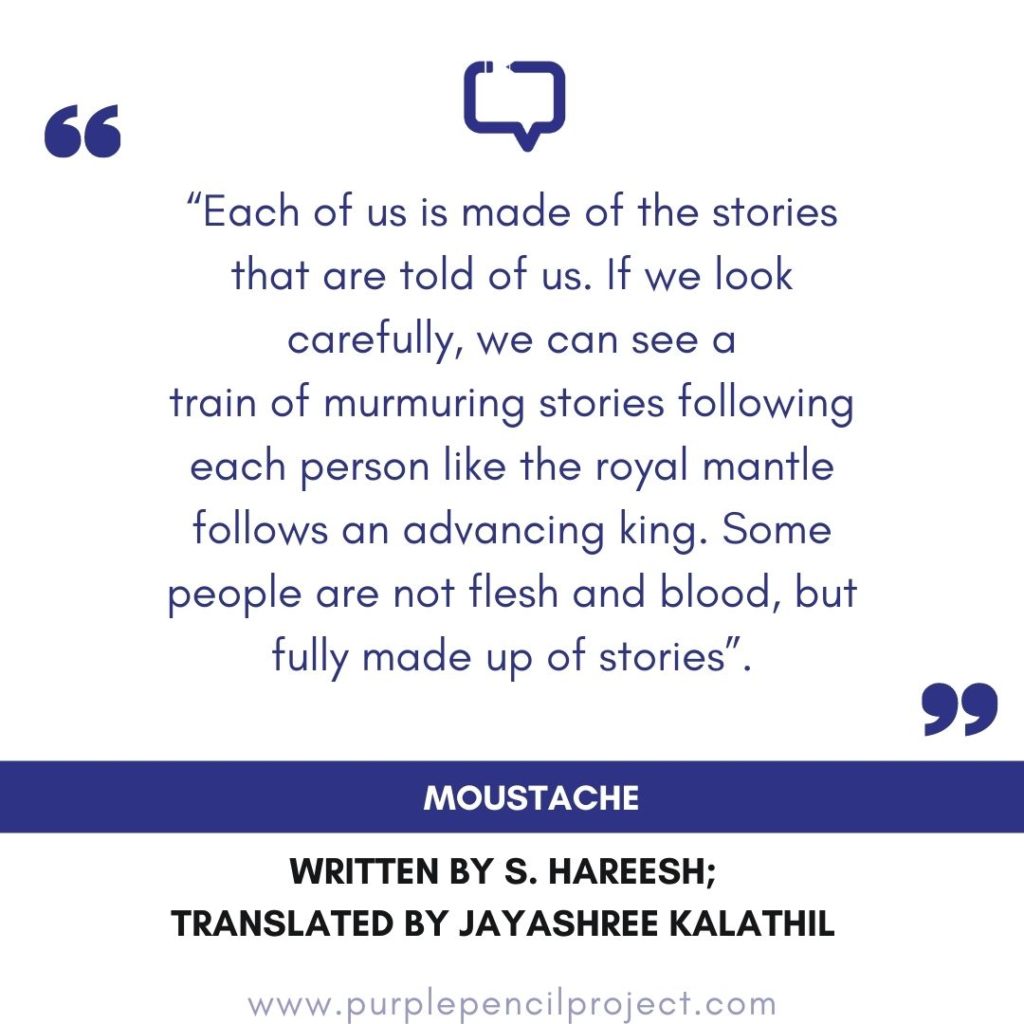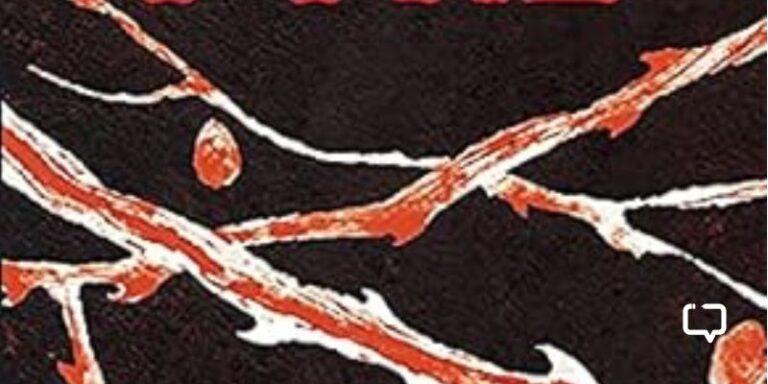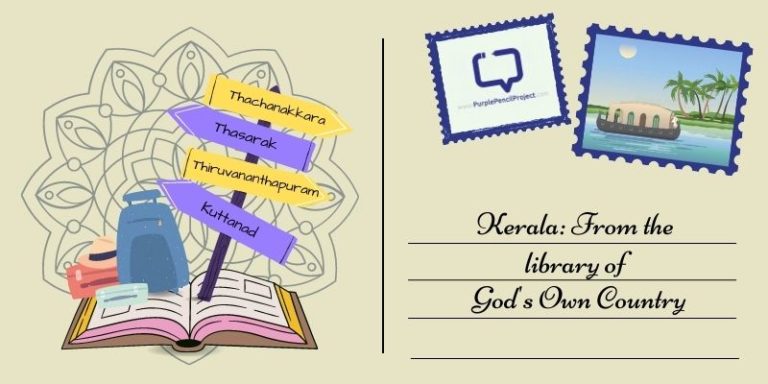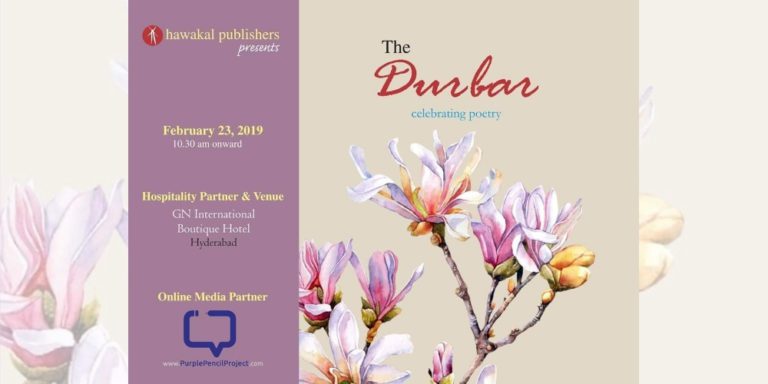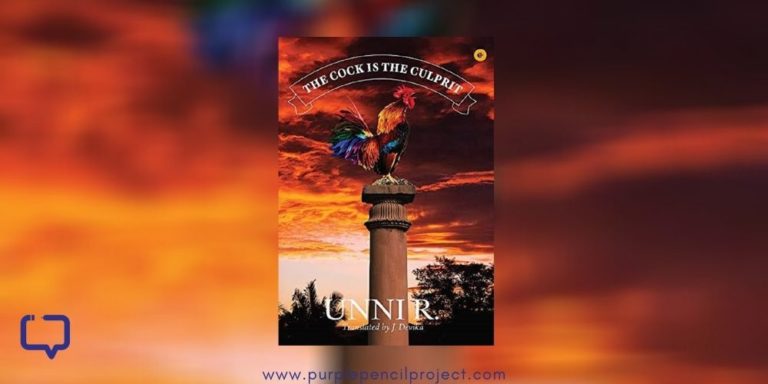Moustache, originally written in Malayalam as Meesha, by S. Hareesh and translated by Jayasree Kalathil into English is an extremely well-written, multifaceted novel which redefines the concept of myths and superheroes. It is fiction fabricated in the lines of folklore and fable, developed through oral tradition; a story within a story – where a myth is created, then destroyed.
We encourage you to buy books from a local bookstore. If that is not possible, please use the links on the page and support us. Thank you.
An ode to the folklore and song ballads which are an integral part of the farming culture of Kuttanad, the place where the story unfolds. Kuttanad is a delta region in the southwest of Kerala with a below sea level farming which gets flooded three times a year. The author uses the uniqueness of the physical landscape, the lushness of its biodiversity, its regional history and its social and caste dynamics to create a multi-layered narrative that deserves all the praise it’s getting.
Everyone talks about you, tells your stories when they are sad or in danger. It’s the songs about you that keep us going, give us hope that tomorrow will be a better day.
Plot points
Moustache is narrated by the author to his son.
It all begins when Vavachan, a pulayan (of traditionally perceived ‘lower cast’) plays the role of a policeman with a big moustache in a play. Despite just appearing in two scenes and having no dialogue, the audience watches him with awe and fear. Vavachan becomes an overnight star and stories about him begin to spread a tremor of fear among people.
After the play, Vavachan decides to not part with his moustache, considered a symbol of masculinity for the ‘upper caste’, which enrages the community, and a few men begin to see him as a threat (feel familiar?). They set on a mission to catch and shave his moustache off.
This leads Vavachan to flee and his escapade eventually turns out to be a quest for a woman named Seetha and for the land Malaya. Meanwhile ‘Moustache’s elusiveness sparks many stories about him appearing simultaneously in multiple places (á la Delhi 6’s ‘Kaala Bandar’) and disappearing magically.
Hareesh uses the device of mythological retelling and the grandiose of ballads when weaving meta-stories of moustache, the hero, the myth, and the villain; complete with Vavachan’s moustache anthropomorphizing and setting on a journey of its own.
What follows through elements of magical realism, mysticism and lots of interesting characters is an intricately layered, and engaging story.
The highs and lows
Moustache, like timeless literature, should, holds more than what meets the eye. As much as the story is about Moustache it’s also about Kuttanad the place, its ecology and its social fabric. Hareesh has written mesmerizingly about its flora fauna, floods, landscape and waterways.
At the same time the book talks in a hard-hitting way about poverty, oppression due to caste hierarchy and the plight of women due to caste, and gender politics. The book was caught in a controversy over a few lines about certain religious practise as well.
The way women characters are treated may come across as objectification, but the fact is that the narrative is about Dalit women, a section that has had to and continues to endure double marginalization and oppression. Most of the female characters like Kuttathi, Chella and even Seeta in spite of their hardship, possess inner strength and fearlessness, and it would have been interesting to read more about their thoughts and hear more of their voice.
The social transition of Kuttanad has also been beautifully weaved into the story along with incidents from history like the Punnapra-Vayalar uprising, temple reforms which marked sociocultural changes, and more.
The reader also meets a vast and vibrant assortment of characters, that includes conversing crocodiles, local mythological figures like Muthan, historical figures like Sree Narayana Guru, Ayyankali, N.N. Pillah and many others.
Though the names of places and people which are very regional may be a handful for the readers to keep track of, that I guess is a price one should pay to enjoy this book in its true flare. Another very clever tool used in the storytelling is allusions to the Ramayana in many instances which gives readers a reference point and thereby adds a strange authenticity to Moustache.
On being a translated title
The translation is seamless and very tastefully done. Since a lot of the story is conversational, encapsulating the ethnicity and rhythm of the original language, and making it a smooth read in the Translated language is a task in itself. Except for very few places where the translation was a bit refined for the premise, Jayasree Kalathil has done a brilliant job. I also liked the fact that few of the words were cleverly retained in the original language which brought a rawness.
Moustache is an excellent piece of contemporary fiction and very aptly so in the JCB shortlist. The book isn’t an easy read, it demands attention but is totally worth it. This is a must-pick for people who like reading magical realism or stories of lands and their inhabitants.
Favourite Quote
